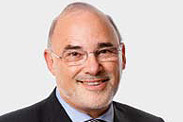HP's Apotheker: Does he have the capital to act long-term?

Hewlett-Packard CEO Leo Apotheker is having a bad day. The company cut its outlook for the second consecutive quarter and HP is quickly falling out of Wall Street's good graces. Apotheker's challenge: Invest in the long-term, fix HP Services, weather a consumer PC meltdown and hit quarterly targets.

HP is caught in the typical long-term vs. short-term debate. Wall Street wants results and better-than-expected earnings every quarter. But businesses need to invest in the long run. Amazon needs to build out its infrastructure. Google needs to build data centers. Verizon decides to build its FiOS network much to the chagrin of analysts at the time.
How these companies are treated when they take an earnings hit is largely the result of how much goodwill the CEOs have. Amazon's Jeff Bezos is cut slack because he's blown off Wall Street before. Google's Larry Page has no track record yet so doesn't get that slack. Apotheker chafes at the short-term view, gets snippy on CNBC and lacks the track record at HP. Apotheker is also capital deficient because he follows a CEO---Mark Hurd---that beat estimates repeatedly (arguably at the expense of long-term results). And then there's Apotheker's SAP track record, which wasn't a model of Wall Street relations.
This context came to roost as Apotheker went through HP's second quarter. The quarterly results were fine, but the 2011 outlook looks weaker than expected. Part of it is consumer PC demand. HP is also seeing a lack of margin growth in HP Services, which was milked to make previous quarters.
It's hard to argue that Apotheker has the right idea---balance long-term and short-term and think about ongoing customer relations. The big question is whether Apotheker will have the time to carry out his master plan.
Let's look at the comments:
There are new market realities in this evolving world and some companies will pay lip service to change, but fail because they will be stuck trying to protect their legacy business models. The winners will be companies who not only talk about the future, but also actually evolve their strategies and adjust their business accordingly. At HP, we intend to lead by making the right customer-focused decisions to take advantage of the changing technology landscape and by executing aggressively on our long-term strategy. As always, these decisions need to be balanced, with a focus on operational efficiency and prudent financial discipline.
Translation: HP has to change and make a few bets at the expense of earnings.
I have concluded that we had a solid strategy for Services, but we didn't invest in the [path] to support the strategy. Instead, HP focused on maximizing its shorter-term margins. We have overexecuted operationally and underinvested strategically. As a result, our short-term margin expectations have been too high. This has impacted our ability to create sustainable growth for the long term. In particular, we have not yet shifted our Services mix to higher value, higher-margin and higher-growth categories. You have seen it in our historical results. Our margins have expanded quickly and significantly, but our revenue has not grown as fast as it can or should, and our mix of ITO Application Services, BPO and NTS, has been unchanged over the past several years. The same is true when I look at recent signings, which have been heavily weighted towards longer-term ITO deals. As we add ITO deals, our margins are pressured as we (inaudible) faster than revenue during the startup phase. We want these ITO deals, but our customers are asking us to expand our application and BPO capabilities more quickly.
Translation: Blame Hurd for the lack of HP Services growth.
We will deepen industry content and form a Business Solutions Group to create more strategic value for our customers. We will enhance our Services offerings in emerging areas, such as cloud services and consulting, application modernization, business analytics and mobility. Third, we will continue to enhance our delivery and sales capabilities. We will be increasing our bench strength in our Application Services business. We will continue to invest in our sales, business development and delivery capabilities to increase customer satisfaction. Finally, we will continue to have a tight focus on operational excellence. We will move forward with modernizing our data centers and rationalizing processes, leveraging HP software. This is my top focus going forward.
Translation: Think of this as IBM-esqe.
We will not abandon our prudent M&A approach. We want to make sure that we are financially prudent and strategically wise and that we are mindful of shareholder value. But we are scanning the market. We are actively engaged, and as in the past, we will be looking at acquisitions in order to [further] the portfolio or at organic growth or at partnering.
Translation: HP is looking to make an acquisition, but a falling stock price doesn't help matters.
We are making tough decisions today to set us up for the future. And in the long term we have multiple levels to drive our EPS growth. But investments we are making today will help create sustainable growth, including sustainable EPS growth, and we are focused on improved business mix and continued operational excellence, including a better mix in each one of our businesses.
Translation: Brace yourself for a rocky ride.